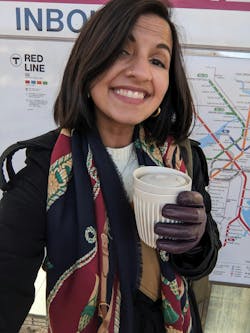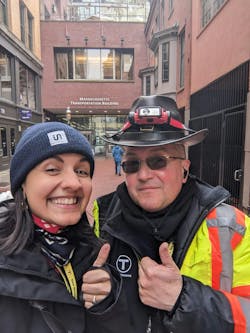One word to describe yourself: Catalyst
Alma Mater: McGill University
Fast fact about yourself: I’ve had a winding career journey: barista, rock musician for babies (ages zero to four), actor/director/playwright are a few roles I’ve held.
What’s your best experience on transit and what made it memorable? I love the way transit brings people together. When I was a barista, I would ride the OL every morning at 5:30 a.m. with my ukulele. Sometimes the other sleepy commuters would ask me to play. Ten years later, I was visiting Boston and riding OL, and a stranger recognized me as “ukulele girl” from all those years ago. It felt like the warmest homecoming squeeze.
Shanti Gonzales, senior program manager, transit data, Massachusetts Bay Transportation Authority (MBTA), has built her career around service: learning new systems, bridging departments and always asking how things could work better for real people. Pivoting from arts and nonprofit leadership, she self-taught basic programming and dove into the transit industry at Transit app, where she fell in love with open data, rider-first design and human-centered public service.
At Transit app, she began in B2B communications and after a few years pitched a new position, engagement manager, to reflect her evolving impact. She deepened agency partnerships, produced award-winning data-driven reports and organized a national partner summit. She grew into a strategic engagement role and helped shape the company’s public sector voice, contributing to award-winning agency communications and national equity conversations.
Gonzales took the lead on an American Public Transportation Association AdWheel award-winning equity report that analyzed survey data to uncover which communication channels reached riders across demographic groups. She also organized a cross-border summit for 20-plus agencies focused on values and vision, not just products.
At MBTA, she started with GTFS data management and quickly took on broader responsibilities. She now leads cross-departmental efforts to ensure service changes are communicated clearly and accurately to the public. She acts as connective tissue between technologists, service planning, operations and agency leadership.
Gonzales stewards digital rider information strategy for her hometown system. Her work ensures that all the downstream touchpoints like digital signage, trip planners and third-party apps reflect the reality of constantly evolving service. She’s led cross-functional tech coordination for high-impact projects, including the Track Improvement Program, Bus Network Redesign and South Coast Rail. Across teams, she’s known for her clear thinking, creative approach, and deep commitment to getting it right for riders.
Colleagues say that during the Track Improvement Program, she didn’t just keep GTFS accurate; she pitched and championed the effort to build a homegrown application that has reduced diversion publishing time by 98 percent, making service changes more nimble and rider friendly. She led a pilot bringing real-time tracking to MBTA ferries using repurposed tech and coordinated digital launches of complex service changes to ensure riders can plan trips on day one.
Gonzales’ impact reaches far beyond her job title. She served as board president of Head & Hands, a youth nonprofit in Montreal, Quebec, guiding a governance transition grounded in accountability and sustainability. She regularly speaks at industry events, including the International Mobility Data Summit, where she joined a global panel to share the MBTA’s industry-leading digital infrastructure.
She’s a dedicated mentor, meeting often with young professionals, former interns and students to support their growth in public service and transportation. Her door (and her calendar) stay open to help others find their path.
Gonzales is proud to work alongside her father, who’s been in MBTA heavy-rail operations for more than 32 years. Their relationship bridges tech and front-line operations, and they often exchange insights on how the other half of the equation works for riders.
She holds a graduate certificate in advanced public administration and governance from McGill University, completed while working full-time. She is a 2022 New York University Rudin Center Emerging Leader in Transportation, and brings cross-border insight from both Boston and Montreal.
Is there a specific experience that led you to where you are today?
When I was a freelancer, I was constantly jumping between gigs (sometimes up to four in one day). Through this high-stakes experiment in multimodal trip planning (especially before GTFS was as widely adopted), I learned how important it was to nail those connections. If I missed my train to bus connection at Forest Hills, another one wouldn’t come for 30-plus minutes, and I needed to make it to my next gig on time.
Public transit is essential. Period. Public transit connected me with my livelihood, and my livelihood was (and still is!) in serving my community. The children I taught needed their teacher and their parents needed that support. As my gigs brought me to new parts of new cities, I discovered new opportunities that would end up transforming my socioeconomic reality. That crash course in trip planning showed me how physical mobility can be a gateway to social mobility.
What do you enjoy most about your job?
I love working firsthand to bring all the different pieces and people from upstream (plans and schedules, operations, administration) together into GTFS to communicate to riders.
What’s the most challenging part of your job?
Probably not surprising: there’s always more to do than we have time or resources for. It’s discouraging when we have the game plan and the know-how to accomplish a goal, but there are so many competing priorities and too little bandwidth to cover it all. It can be a real challenge to weigh different types of impact and strategize accordingly. It requires an openness toward emergent strategy and to shifting on our feet.
What is the accomplishment you’re most proud of and why?
I’m most proud of making this kind of work more accessible and less of a black box, both for my peers and for those who are newer to the space. Transit data can sound intimidating or highly technical but translating the “how” (planners write schedules, buses send us vehicle locations, track circuits light up when the train is on them) helps make GTFS make sense as an extension of service delivery. In 2025, the rider experience starts in our pockets: when we open our phones to find out when the next bus is.
This translation work helps build organizational support for impactful projects like Arrow, our in-house application for managing diversions in GTFS, or process improvement and relationship building across the authority to ensure riders are prepared with seamless data about service changes, planned or unplanned.
What is an accomplishment you would like to work towards in your career?
I want to work toward improving organizational resilience in service delivery. At Transit app, I got to work with many different agencies, with different organization structures and challenges; and now at the MBTA, I’m seeing the complexity of a big organization covering multiple modes and municipalities. I’ve seen how much transit agencies are asked to do with limited resources. We drum up solutions every day while still delivering full service.
My coursework in public administration has helped me think about what it would take to build a department that’s truly proactive and resilient in the face of 21st century transit problems. I hope I someday have the privilege to bring this perspective to the table.
What is your best advice/tip/best practice you can share from your area of expertise?
In doing the work: Understand the problem. Articulate it five different ways. Don’t assume you know the solution. Then try things. Learn by doing, don’t get paralyzed by overthinking.
In getting the job: Code-switch. Learn the language of your next role. Translate your experience: “freelancer” can also mean “deadline-driven project management.” Speak new dialects and bring your own clarity with you.
About the Author
Brandon Lewis
Associate Editor
Brandon Lewis is a recent graduate of Kent State University with a bachelor’s degree in journalism. Lewis is a former freelance editorial assistant at Vehicle Service Pros in Endeavor Business Media’s Vehicle Repair Group. Lewis brings his knowledge of web managing, copyediting and SEO practices to Mass Transit magazine as an associate editor. He is also a co-host of the Infrastructure Technology Podcast.




